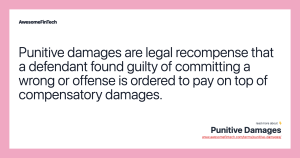Punitive Damages
Punitive damages are financial penalties a court can order a defendant to pay on top of compensatory damages in cases where the conduct was considered to be grossly negligent or intentionally malicious. These additional awards are meant to punish the defendant and deter others from similar misconduct in the future. In some states, they are also known as exemplary damages.
A jury is the decider in a punitive damages case and will weigh a variety of factors. The most important factor is the severity of the harm suffered by the plaintiff. This will include both the level of injury and any property damage that was incurred. A fender bender car accident, for example, is much less severe than an explosion that destroys your house. The defendant’s level of reprehensibility will also play a role in whether or not punitive damages are appropriate.
For a claimant to successfully secure punitive damages, the claimant will need to show that the defendant’s conduct was not only egregious but likely to cause harm in other instances. The defendant must also have been aware that there was a substantial risk of harm and failed to take reasonable steps to avoid such an outcome. The type of conduct that would prompt a court to award punitive damages includes, but is not limited to:

What Are Punitive Damages?
If the defendant is a company, it’s usually the case that their assets will be taken into account when determining the amount of the award. While a judge or jury will still consider the above factors, it’s also important for them to think about the company’s ability to pay. The higher the punitive damages award, the more the company will need to set aside for this purpose.
In a case where the company’s assets are very high, it may be necessary for a judge or jury to limit the amount of punitive damages to prevent the company from going bankrupt or having to sell off its assets. In many cases, a punitive damages award will not exceed four times the amount of the compensatory damages awarded to the plaintiff.
Punitive damages are rarely available in personal injury claims and are only granted when the defendant’s conduct is egregious enough to justify them. The most common situations in which punitive damages might be awarded are when the defendant’s actions were malicious or willfully reckless and carried a high degree of risk that someone else could be seriously injured by their behavior.
For instance, a doctor who performs surgery on the wrong body part or drives drunk and collides with innocent bystanders are both examples of such behavior. To learn more about the different types of personal injury claims and to see how a Connecticut attorney can help you, contact our firm today. We offer a free consultation to review your case and answer any questions you may have. We are proud to serve clients throughout the state of Connecticut. We also handle cases involving wrongful death and commercial litigation.